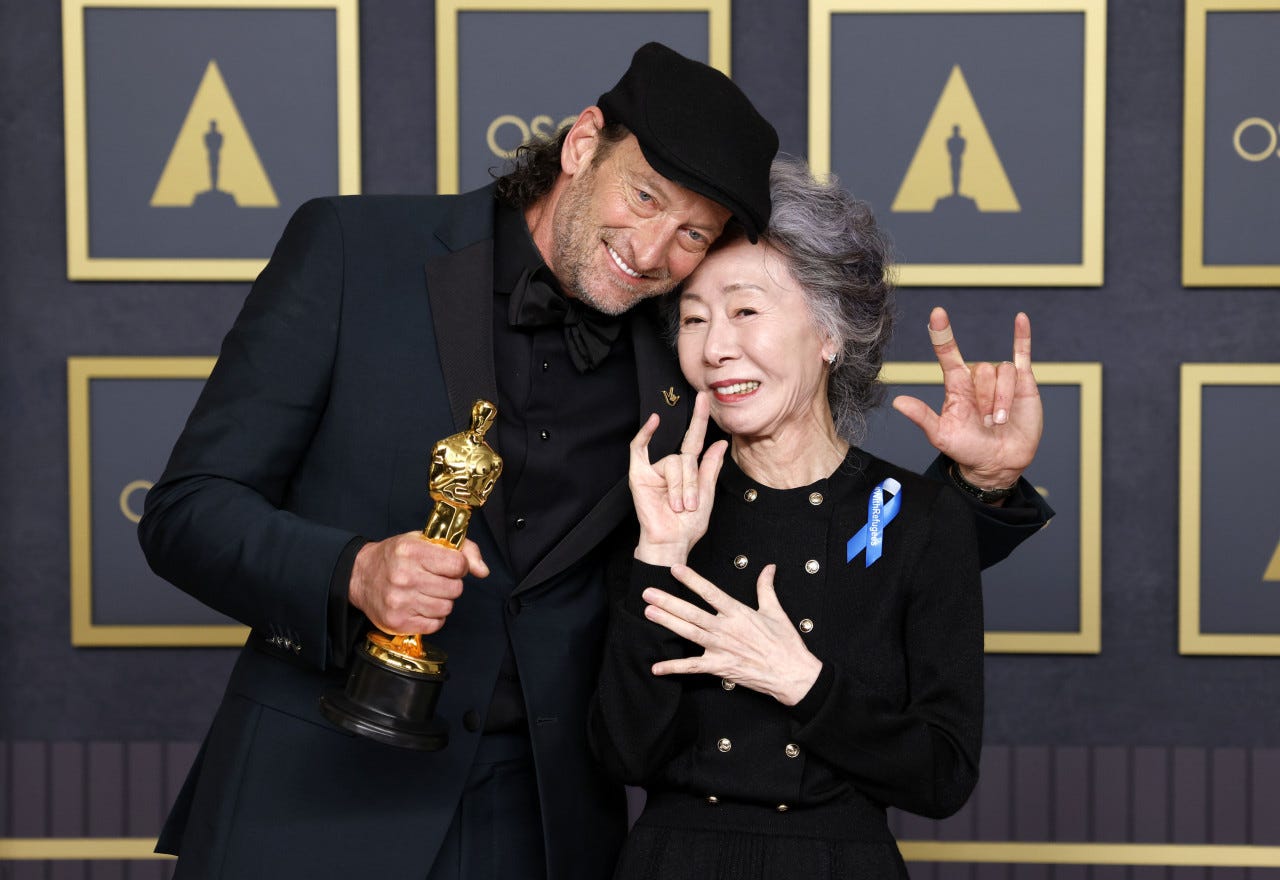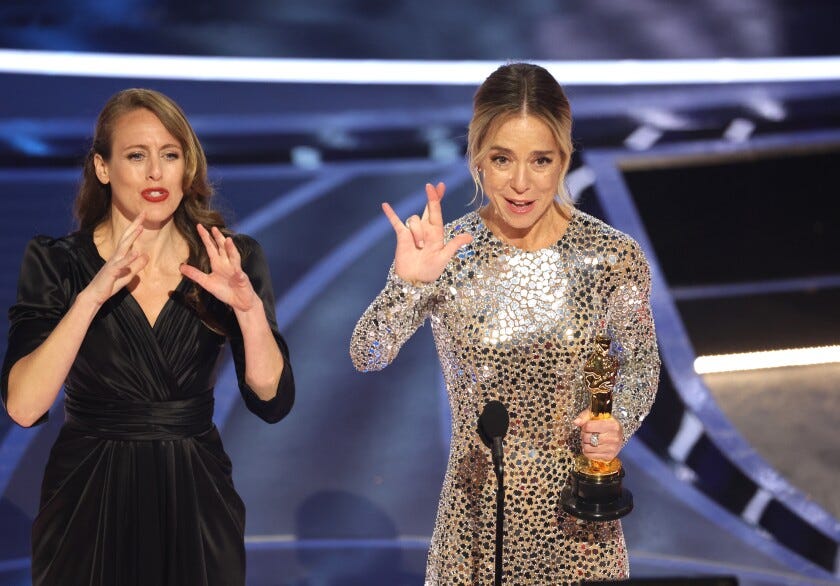Last Looks: On Language in the Top Films of 2021
The triumphs of cross-language communication over "foreign" language punchlines
In the last days of February, I was nearly finished writing a post about the racist Japanese language gag in Licorice Pizza when my appendix ruptured, sending me to the hospital. I’m doing fine now! But after letting this topic breathe for another month, it didn’t feel right to simply pick back up with what I had. And now that the Oscars have passed, I am heartened by how respect for language difference in this year’s most revered films has ultimately prevailed.
Nothing has changed about how I feel about Licorice Pizza, and having to listen to a white man use a horrendously offensive Japanese accent to speak in English to one Japanese wife, and then to a second Japanese wife, because writer-director Paul Thomas Anderson saw it necessary to double down on the objectification before the big reveal that this man does not speak or understand his wives’ language. And nothing has changed about how ignorant I found Anderson’s responses to be when questioned about the much-discussed “joke.”

If nothing else, I wish I’d been in a theater of people who gasped instead of laughed at these scenes. That was the experience that The New York Times’ Kyle Buchanan shared when he challenged Anderson’s assertion that there “isn’t a provocative bone in this film’s body” (because he also doesn’t get the discourse around age difference). Anderson chalks it up to the realism of the time period, and also shares his personal experience of hearing white people speak to his Japanese mother-in-law that way, apparently unaware that they’re doing it. You can say it’s none of my business to wonder how his mother-in-law feels about it, but I can tell you that the only Japanese-accented English I heard growing up in a mixed family was my dad filling his pretty-good Japanese in with the occasional English word. I personally can’t imagine letting what’s in the movie fly within my family.
I’m not exaggerating when I say I came home from seeing this movie feeling nauseous. Every awards nod was a kick in the shin, especially the writing ones. Every white person who saw fit to address the racism by saying that it mars an otherwise amazing movie was salt in the wound. I don’t really care if you liked Licorice Pizza. But I do care that people can’t bear to decenter their love for a film or a director for even a moment to really sit with the fact that they took pleasure in something that people are speaking out about as being harmful.
A resurgence in this conversation that occurred between my first attempt at writing this post and the Oscars has really rounded out my thoughts on all of this, and has better articulated the feelings I’d been having. For the LA Times, Jen Yamato contextualizes how this “period typical racism” plays in our present day, where we’ve seen a spike in hate crimes perpetrated against Asian people, particularly Asian women. To that end, the joke does less to ground us in the 1970s, and speaks more to how little has changed. In a Patreon writeup shared to their Twitter, Youngmi Mayer wrote that the problem isn’t necessarily that Anderson shed light on a kind of racism, but more that it was a joke for an Asian woman to tell, a joke that Asian women have been telling, and he essentially stole that experience for his own use.

It was always interesting to me that people were so forgiving of Licorice Pizza in the year of Drive My Car. Ryusuke Hamaguchi’s emotional road film, based on a short story by Haruki Murakami, is not only notable this season as the first Japanese film to be nominated for Best Picture in the Oscars’ 94-year history, but as a film with communication across languages at its very heart. A film containing a play performed by actors all speaking different languages, and the kind of connection and communication required of all its players, seems antithetical to the low-brow humor of The Joke from Licorice Pizza. Voting bodies this season at once applauded Anderson’s script, despite or in acceptance of its missteps, while also agreeing that a three-hour Japanese drama with its multilingual cast was one of the most notable films of the year. It makes me think about Parasite’s incredible run in the 2020 awards season, and all the chatter around English speakers’ willingness to read subtitles. Though Drive My Car wasn’t quite the Best Picture competitor Parasite was, its presence seems to continue moving the needle forward.
There are two things I want to note about Hamaguchi’s acceptance speech for Drive My Car’s Best International Film Oscar. The first is something else that’s reminiscent of the Parasite year, which is that the lack of acting nominations should feel like a glaring omission. Hamaguchi made sure to give credit where credit was due to Hidetoshi Nishijima, Tōko Miura, and the supporting cast, but it would have been nice to hear those names more often from critics and voters throughout the season. The second thing is that the Oscars have got to stop playing winners off the stage prematurely. This is by no means a new phenomenon, but it was particularly painful to watch this year when Hamaguchi took a pause, and the band began to play loudly. There’s been plenty of talk about what a bad move it is to cut categories to try to shorten the broadcast. It’s also a bad move to be so concerned with moving the show along that you can’t spare a winner a moment to pause, especially if English is not their primary language and/or they’re collaborating with an interpreter. A little grace and consideration should not be too much to ask for.

And finally, we can’t talk the triumphs of language in Oscar-recognized films this past year without talking about the incredible journey of CODA. My absolute favorite moment of the night (which in no way has to be diminished by what we all know to be the “biggest” moment of the night, because you can actually care about more than one thing at a time), was Troy Kotsur’s historic Best Supporting Actor win. It was a victory that could be seen from a mile away, and it still felt fantastic to watch him become the first deaf man to win an acting Oscar, and second deaf actor overall to win, after his CODA costar Marlee Matlin (Children of a Lesser God, 1986).
First of all, who better to present you with your award than Youn Yuh-jung, last year’s best supporting actress for Minari? She apologized in advance for her pronunciation of the nominees names, since she had been vocal about how hers was being mispronounced last year. It was entirely unnecessary, because not only did she do just fine with the names, but before announcing Kotsur as the winner, she excitedly signed her love and congratulations to him. She then held his statue for him so he had both hands to sign yet another lovely speech, in which he called CODA writer-director Siân Heder “the best communicator,” which I think is just such an incredible compliment. Even just thinking about this all again really makes me tear up.

I’ve seen people on this cursed Internet express irritation with CODA’s Best Adapted Screenplay and Best Picture wins, and quite frankly, I don’t care. It’s a perfectly nice film that had undeniable staying power after debuting all the way back at Sundance 2021. Quite frankly, maybe people just needed a feel-good win this year, and we are not nearly far out enough from, say, Green Book’s Best Picture win to be high and mighty about this year’s outcome. CODA is only the third-ever Best Picture winner in Oscars history to be directed by a woman (preceded by Chloé Zhao’s Nomadland just last year, and Kathryn Bigelow’s The Hurt Locker in 2009), and it lovingly and honestly portrays a family dynamic that we don’t get to see a lot on screen. Though accessibility conversations have been ongoing in film spaces, the Oscars’ live ASL interpretation feed was brand new this year, and one has to imagine CODA’s inclusion (and perhaps Sound of Metal last year) tipped that offering into necessity in the eyes of the showrunners.
At the end of the day, I am relieved that I did not have to watch Licorice Pizza win anything, but I’m glad to also feel buoyed by this recognition for a Japanese arthouse film, and for a film that gave space to deaf actors to really act their asses off. I said earlier that the Licorice Pizza joke cannot simply be written off as “of the past,” because we can see very clearly that that kind of racism is alive and well. But when compared to what other filmmakers brought to the table this year, what is outdated is the present day choice to commit that hard to that joke. As this long awards season finally comes to a close, I’m grateful to the better films that are leaving those deeply unfortunate scenes in the dust.


